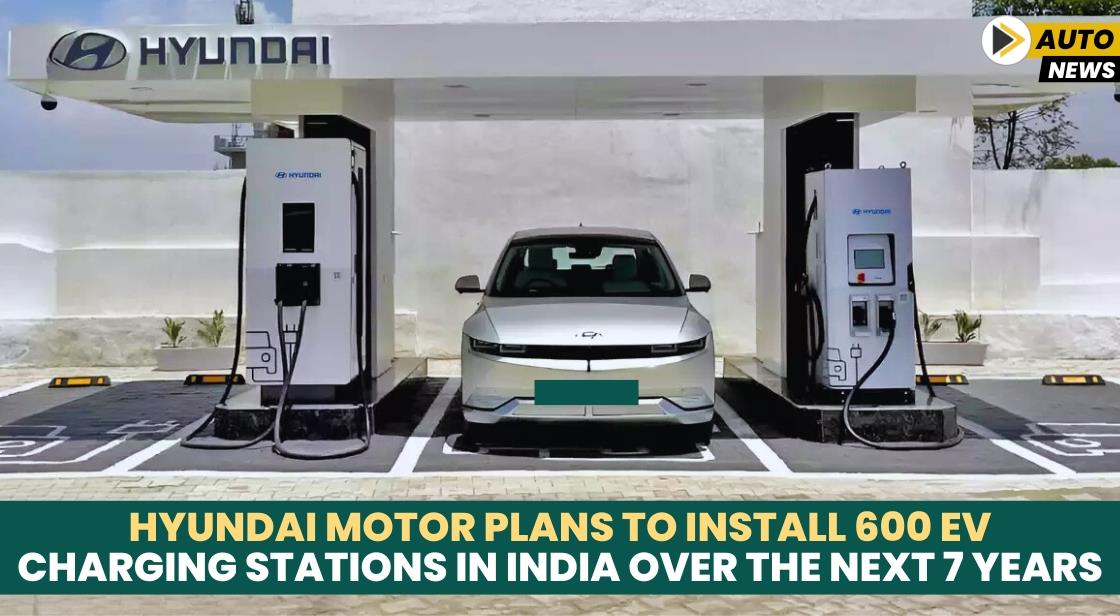Hyundai Motor Plans to Install 600 EV Charging Stations in India Over the Next 7 Years

News Synopsis
Hyundai Motor India Limited (HMIL) has announced an ambitious plan to set up nearly 600 fast charging stations for electric vehicles (EVs) across the country in the next seven years. These stations will be strategically placed along key highways and major cities to promote EV adoption and address the growing demand for accessible charging infrastructure.
In the coming months, Hyundai will also unveil its first mass-market electric vehicle, the Creta EV, which is expected to be a significant game-changer in the Indian EV market. Currently, Hyundai's sole electric offering in India is the Ioniq 5, a premium EV priced at Rs 46.05 lakhs (ex-showroom).
Expanding Charging Infrastructure in India
As part of its vision to create a comprehensive EV ecosystem, HMIL is accelerating the expansion of its charging network. By the end of this month, the company plans to roll out 50 fast charging stations across the country. These stations will be open to all electric vehicles, regardless of the brand, ensuring that EV owners have more options for fast, convenient recharging.
“HMIL’s fast charging stations will be strategically located at prominent locations such as coffee shops, restaurants, and shopping areas, offering customers more than just a place to recharge their vehicles,” the company stated. 24x7 CCTV surveillance at most stations ensures customer safety, while trained marshals will be available to assist users with their charging needs.
Jae Wan Ryu, Function Head-Corporate Planning, HMIL said, “The EV market is expected to grow robustly by 2030. Studies conducted by HMIL have highlighted that customers are apprehensive about driving their EVs for long-distance commutes on highways due to a lack of charging infrastructure. Keeping this in mind, HMIL has taken the initiative of installing fast EV chargers on key highways, in addition to major cities.”
He added, “With access to Hyundai Motor Corporation’s (HMC) global EV and battery technology, HMIL is well-positioned to build a comprehensive EV ecosystem in India.”
Locations and Expansion Plans
Hyundai Motor India Limited (HMIL) has already established EV charging stations in major Indian cities such as Gurugram, Mumbai, Pune, Bengaluru, Hyderabad, Ahmedabad, and Chennai. In addition, it has created a pan-India network by setting up stations along major highways like Delhi-Chandigarh, Delhi-Jaipur, Hyderabad-Vijayawada, Mumbai-Pune, Mumbai-Surat, Bengaluru-Pune, and Pune-Kolhapur.
This move is in line with the company’s long-term strategy to accelerate the adoption of electric mobility in India and alleviate concerns over charging infrastructure, particularly for long-distance travel.
The Growing EV Market and Competitors’ Plans
The Indian electric vehicle market is witnessing substantial growth, with several prominent automakers preparing to launch their electric cars. Maruti Suzuki India is set to introduce its first electric car in India in the next year, while Toyota Kirloskar Motors and Hyundai’s sister company Kia are also slated to launch their mass-market electric vehicles by 2025.
Earlier this year, the Central Government launched the PM E-Drive scheme, which aims to enhance EV adoption by developing a robust charging infrastructure. Under this initiative, a significant allocation of Rs 2,000 crores has been earmarked for the development of 88,500 fast charging stations across the country.
These will cater to various vehicle categories, with 22,100 charging stations for electric four-wheelers, 48,400 stations for two- and three-wheelers, and 1,800 stations for electric buses.
Conclusion: Accelerating the EV Revolution in India
Hyundai’s investment in fast charging infrastructure plays a crucial role in accelerating the EV revolution in India. With the government’s support and growing interest in electric mobility, the country is poised to become one of the largest EV markets globally.
Hyundai's move to install nearly 600 charging stations over the next seven years, alongside the introduction of more affordable electric models, will significantly enhance the EV ecosystem in India, making it easier for consumers to transition to sustainable mobility.









